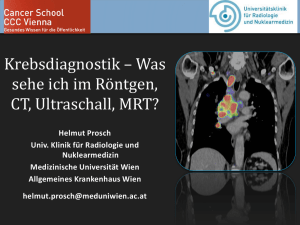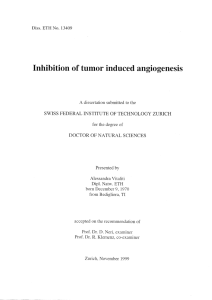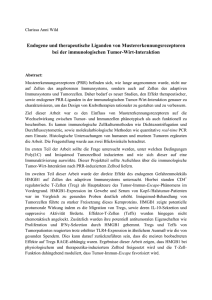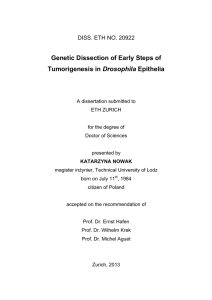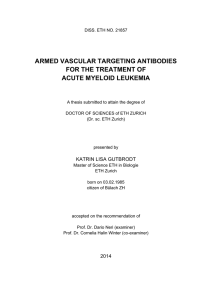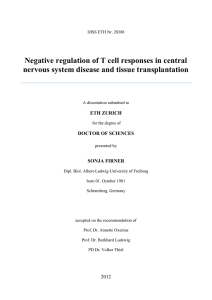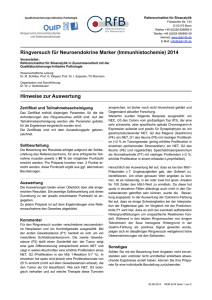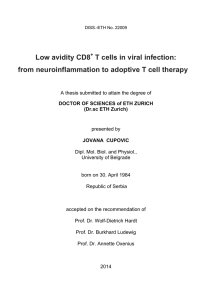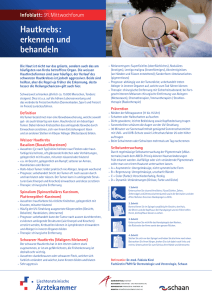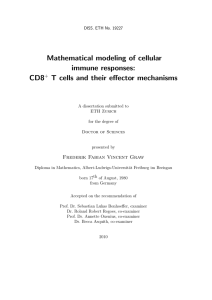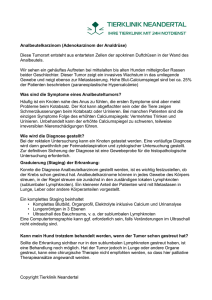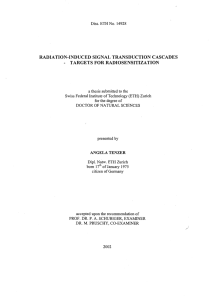NOVEL IMMUNOCYTOKINES FOR VASCULAR TUMOR
Werbung
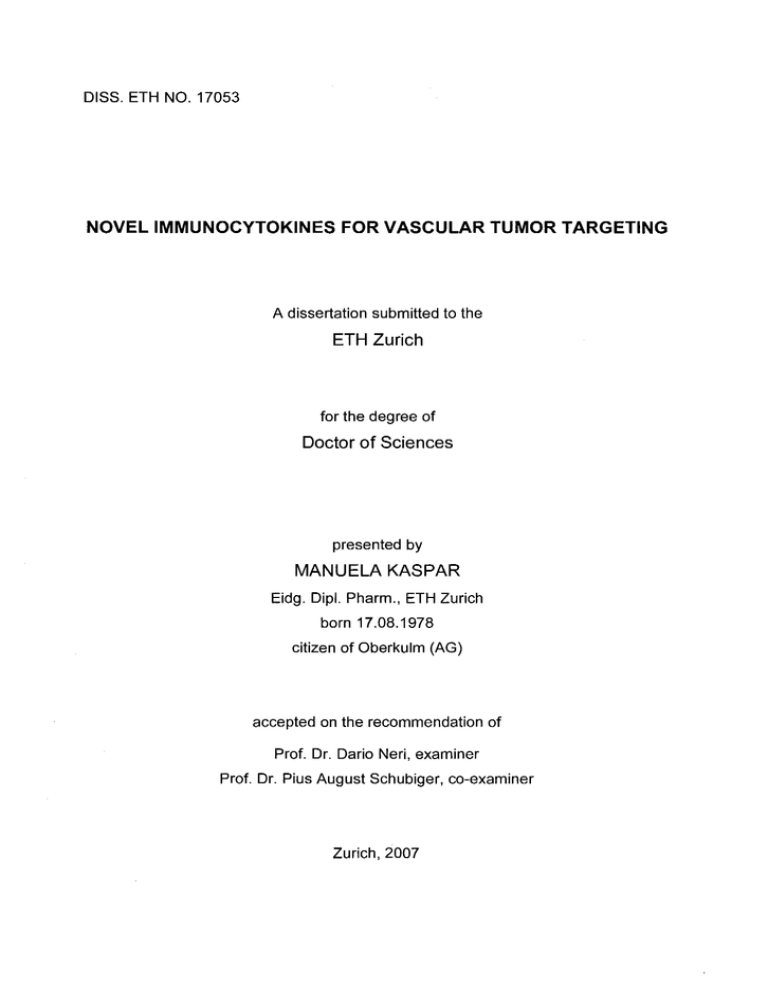
DISS. ETH NO. 17053 NOVEL IMMUNOCYTOKINES FOR VASCULAR TUMOR TARGETING A dissertation submitted to the ETH Zurich for the degree of Doctor of Sciences presented by MANUELA KASPAR Eidg. Dip!. Pharm., ETH Zurich born 17.08.1978 citizen of Oberkulm (AG) accepted on the recommendation of Prof. Dr. Dario Neri, examiner Prof. Dr. Pius August Schubiger, co-examiner Zurich, 2007 1 Summary Many pro-inflammatory recombinant cytokines display potent anti-cancer activities, but their preclinical and clinical use is often limited by the fact that unacceptable toxicities can be observed already at very low cytokine doses, preventing escalation to therapeutically active concentrations. In most cases, cytokines do not preferentially accumulate at the tumor site following intravenous administration. For this reason, the antibody-based targeted delivery of cytokines to the tumor environment appears to be a promising strategy, for enhancing the therapeutic index of these potent anticancer agents. The targeted delivery of bioactive agents to the tumoral neovasculature seems to be a particularly promising anti-cancer therapeutic modality, considering the fact that a vigorous neo-vasculature development ls a characteristic feature of aggressive solid tumors and that tumor blood vessels are readily accessible for intravenously-administered therapeutic agents. In this thesis, I have studied the anti-cancer properties of interleukin-15 and GMCSF, fused to the human antibody fragment scFv(L19) specific to the EDB domain of fibronectin, a marker of angiogenesis. IL15 is a potent pro-inflammatory cytokine, whose mechanism of action partially overlaps with the one of IL2. Both cytokines stimulate the proliferation of T cells, induce the generation of cytotoxic T Iymphocytes (CTLs), facilitate the proliferation of and the synthesis of immunoglobulin by B cells and induce the generation and persistence of natural killer (NK) cells (Waldmann 2006). However, in many adaptive immune responses, IL-2 and IL-15 have distinct, and often competing roles. IL-15 is important in the maintenance of long-Iasting, high avidity T cell responses and it achieves this by supporting the survival of CD8+ memory T cells. GM-CSF is a cytokine associated with the growth and differentiation ot hematopoietic cells. Furthermore, it is a potent immunostimulator with pleiotropic effects, including the augmentation of antigen presentation in a variety of cells, increased expression of MHC class 11 on monocytes and adhesion molecules on granulocytes and monocytes, and amplification of T cell proliferation. 5 The fusion proteins L19-IL15 and L19-GMCSF were expressed in mammalian cells and purified to homogeneity, revealing no loss of cytokine activity in in vitra assays. Furthermore, the ability of the two immunocytokines to selectively localize to tumors in vivo was confirmed by biodistribution analysis with radioiodinated protein preparations. L19-IL15 and L19-GMCSF displayed a potent anti-tumor activity both in subcutaneous and in metastatic F9 and C51 murine models of cancer in immunocompetent mice. This therapeutic action was superior compared to IL15- and GMCSF-based fusion proteins, containing antibodies of irrelevant specificity in the mouse, which were used as non-tumor-targeting controls. For both L19-IL15 and L19-GMCSF immunocytokines, CD8+ T cells appeared to mostly contribute to the therapeutic action, as demonstrated by in vive cell depletion experiments. The results presented in this thesis are of c1inical significance, considering the fact that the sequence of EDB is identical in mouse and man, and that the tumor-targeting ability of the L19 antibody has been extensively demonstrated in c1inical trials in patients with cancer. 6 Zusammenfassung Viele rekombinante pro-inflammatorische Zytokine weisen starke antitumor Wirkung auf. Ihr präklinischer und klinischer Gebrauch wird jedoch oft durch die hohe Toxizität limitiert, die meist schon bei niedrigen Dosen auftritt, und dadurch eine Dosiserhöhung zu therapeutischen Konzentrationen verunmöglicht. In den meisten Fällen reichern sich Zytokine nach intravenöser Applikation nicht bevorzugt am Tumor an. Daher scheint die gezielte Anreicherung von Zytokinen am Tumor mittels Antikörper ein vielversprechendes Konzept, um den therapeutischen Index dieser sehr wirksamen Krebs-Therapeutika zu verbessern. Die gezielte Anreicherung bioaktiver Substanzen an neugebildeten Blutgefässen des Tumors scheint eine besonders Erfolg versprechende Therapiemöglichkeit zu sein, da die Neubildung von Blutgefässen charakteristisch für solide Tumore ist, und diese für intravenöse applizierte Therapeutika leicht erreichbar sind. In dieser Dissertation werden die Effekte von Interleuin-15 und GM-CSF, gekoppelt an das humane Antikörperfragment scFv(L19), auf das Tumorwachstum untersucht. L19 erkennt spezifisch die EDB Domäne von Fibronektin, einen Marker für Angiogenese. Interleukin-15 ist ein sehr wirksames pro-inflammatorisches Zytokin, dessen Wirkungen teilweise mit denen von Interleukin-2 übereinstimmen. Beide Zytokine stimulieren die Proliferation von T Zellen, induzieren die Bildung von zytotoxischen T Lymphozyten, erleichtern die Vermehrung von B Zellen sowie deren Synthese von Antikörpern, und ermöglichen die Bildung, sowie das Überleben von natürlichen Killer (NK) Zellen. Trotzdem haben IL-2 und IL-15 in vielen adaptiven Immunanworten verschieden und oft auch kompetitve Funktionen. IL-15 ist wichtig für die Aufrechterhaltung einer lang anhaltenden, hoch affinen T Zell Antwort. Dies erreicht IL-15, indem es das Überleben von CD8+ memory T Zellen unterstützt. GM-CSF ist ein Zytokin das mit dem Wachstum und der Differenzierung von hämatopoetischen Zellen assoziiert ist. Zudem ist es ein sehr wirksamer Immunostimmulator mit pleiotropischen Effekten, wie der Steigerung der Antigen 7 Präsentierung in verschiedensten Zellen, einer erhöhten Expression von MHC Klasse 11 Molekülen auf Monozyten und Adhäsionsmolekülen auf Granulozyten und Monozyten, sowie der Vervielfältigung der T Zell Proliferation. Die Fusionsproteine L19-IL15 und L19-GMCSF wurden in Säugetierzellen exprimiert, bis zur Homogentiät gereinigt, und zeigten keinen Aktivitäts-Verlust in in vitro Tests. Zudem konnte mittels Biodistributions-Experimenten mit radioaktiv markierten Proteinen die selektive Anreicherung der zwei Fusionsproteine in Tumoren in vive bestätigt werden. L19-IL15 und L19-GMCSF zeigten eine starke therapeutische Wirkung in subkutanen, sowie auch in metastatischen F9 und C51 murinen Tumormodeln in immunokompetenten Mäusen. Diese therapeutische Wirkung war überlegen im Vergleich zu IL-15 und GMCSF basierenden Fusionsproteinen, die aus Antikörpern mit irrelevanter Spezifität bestehen und als nicht selektive Kontrollen gebraucht wurden. Für beide Immunozytokine, L19-IL15 und L19-GMCSF, scheinen hauptsächlich CD8+ T Zellen zur Therapie beizutragen, wie mit in vive T Zell Depletions Experimenten gezeigt werden konnte. Die Resultate, welche in dieser Dissertation präsentiert werden, sind von klinischer Signifikanz, da einerseits die Sequenz von EDB von Maus zu Mensch identisch ist, und sich der L19 Antikörper andererseits selektiv im Tumor anreichert, wie in klinischen Versuchen mit Patienten gezeigt wurde. 8
